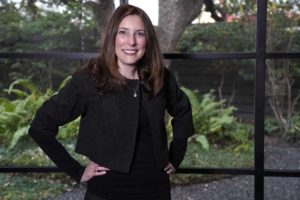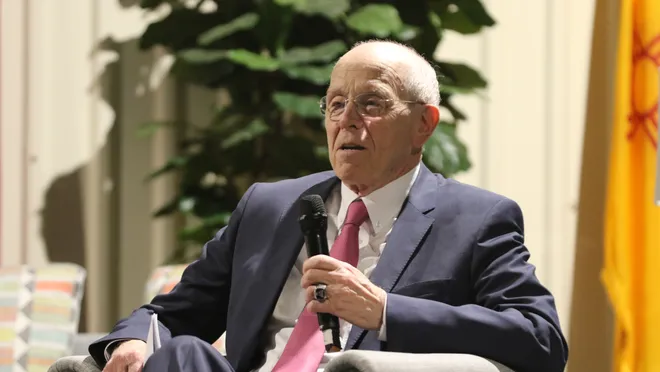 Stephanie Hertzog took the helm of Sodexo Energy just six months before the whole world was upended by the coronavirus pandemic.
Stephanie Hertzog took the helm of Sodexo Energy just six months before the whole world was upended by the coronavirus pandemic.
In short order, Sodexo Energy’s facilities management and cleaning services were in high demand as essential operations at offshore oil platforms, refineries and petrochemical plants continued running throughout the pandemic. Hertzog, CEO of Sodexo Energy & Resources North America, said she learned quickly to adapt to a new normal, chartering private planes to transport face masks from China to help ensure a safe workplace for her employees and oil and gas customers throughout the crisis.
“In Texas, we are used to crisis management. We have hurricanes, we have a playbook, we know what to do,” the Pasadena native said. “But nobody’s written a playbook for how to handle a global pandemic.”
Hertzog, who followed her chemical engineer father into the oil and gas industry, worked at Celanese Chemical for three years before going to Harvard Business School to pursue a career in oil-field services. After spending time at McKinsey consulting, Exterran equipment manufacturer and Tally Energy Services, she joined Sodexo Energy, part of global food services and facilities management giant Sodexo. The 2,800-employee subsidiary provides food, janitorial, maintenance and security services to many of the major oil companies in North America.
On HoustonChronicle.com: The evolution of ‘man camps’ – from tents to basketball courts and swimming pools
Hertzog spoke with Texas Inc. about how she managed the spike in demand for cleaning services and what the future of the energy workplace looks like after the pandemic ends.
Q: How did you end up at Sodexo Energy?
A: In my role prior to Sodexo, I was in directional drilling completion tools and artificial lifts, so it was very much hands on with fracking jobs out in the field. I spent a lot of my time out in Midland talking to people about new technologies and what was going to make us be able to make a better well. I heard more than once that whoever can improve the quality of life for the employees out in the field are the ones who are going to figure out how to make a better well. And so when a recruiter called with Sodexo, I jumped at the opportunity.
Q: There’s a wide range of oil and gas workplaces. How do you logistically serve all these different work environments?
A: We have everything from offshore platforms, refineries, chemical plants, man camps and office buildings, so it’s a pretty broad spectrum. In some places like offshore, our customers are living with you for three weeks at a time before they go back onshore, so you’re providing breakfast, lunch and dinner; you’re cleaning their room; you’re changing out the mattresses and the rooms. It’s very different from a traditional office environment where someone is there, well, pre-COVID, from 8 a.m. to 5 p.m. In our space, people are really concerned about value, so being really efficient and really excellent at what we do is important, regardless of that environment.
Q: You started at Sodexo right before the novel coronavirus broke out. How has the pandemic affected your business?
A: Most of our customer base are considered essential businesses, and so a lot of them have been operational throughout the pandemic. They’ll have a COVID case come in so they’ll have to retract, but generally they’ve been operational and almost at full capacity, so we’ve done OK.
Q: What has been the biggest challenge dealing with the pandemic?
A: There was a lot of scrambling at first. We were ordering personal protective equipment from China and having to charter planes to get it here. We were having to write new standard operating procedures for everything from how you transport an individual who’s been exposed to how to deliver meals to someone in quarantine. There were just so many things that we had to go to the drawing board and figure out. We’ve taken on temperature screening, we’ve implemented contactless payment at our grab-and-go cafeterias and introduced delivery options. And so we’ve had to really adjust how we do things. We’ve come a long way. We’ve learned a lot since March.
Q: I’d imagine it’s difficult to contain an outbreak in a remote place like an offshore rig. Have you seen many COVID-19 cases among your employees?
A: Amazingly, it hasn’t been bad. These platforms are kind of like mini cruise ships, with very small living environments, but we’ve done a lot of work with our clients to keep the risks at bay. We’ve implemented social distancing and mask wearing. Everyone gets tested and quarantined before they’re allowed to go on the platform. We’re constantly cleaning, and the janitorial needs have gone up significantly. In office buildings, we’ve staggered start times so we don’t have people congregate. We’ve been able to do a lot to not have it spread. There have been some challenges when we had to have people quarantine or people out for COVID. There’s always some labor challenges there, but we’ve been able to manage it.
Texas Inc.: Get the best of business news sent directly to your inbox
Q: You were thrown into this new role a few months before the pandemic. How did you learn how to tackle this challenge?
A: After I started in September 2019, I was on the road almost every week from Sept. 20 until March 10, which was my last trip. I got to meet a lot of my team and spend a lot of time on sites and see what we do, so that was really helpful. Not getting to know people before working remotely would have been very hard. I know a lot of people have started new roles in the middle of COVID and I’m grateful that I had that opportunity to meet people face-to-face beforehand and have that base of relationships. In regards to learning how to tackle this, I’m not sure that anybody’s got the experience to navigate something we haven’t seen before. We had a central group of experts putting new operating procedures together, and we have a medical counsel that was helping consult on how we handle the medical issues. But we had to figure it out together with our clients. Frankly, we’re all still doing that.
Q: As the coronavirus vaccines are rolled out, how is Sodexo handling that, in particular getting your front-line workers vaccinated in remote areas like oil fields and offshore rigs?
A: Sodexo is encouraging employees to get vaccinated, but we are not requiring employees to get vaccinated unless our customers are requiring it to have them on site. I haven’t yet had a client tell me that I need to have my employees vaccinated, but we’re encouraging employees because we think that that’s the right thing to do.
Q: What are the challenges working in remote places like Alaska?
A: We have a lot of remote sites. Offshore rigs, of course, but also on the north side of Canada where everything needs to come in by boat and can only come in a couple of times a year when the ice melts. One of our big sites is on the North Slope of Alaska. It’s pretty remote. You have to get on a plane to get there. We have chefs and bakers cooking everything you can imagine on site, and so we have to have everything delivered there. With our offshore platforms and really remote sites, we usually keep two to three weeks of food supply on hand at any given time, just in case there’s an interruption with the food supply chain or we can’t get there.
Q: How do you make these remote places more livable and enjoyable for workers?
A: First of all, food is really important. When your only source of food is the dining facility on site, it needs to be good, have variety and meet a lot of different needs. Cafeterias have gone from a lot of big greasy hamburgers to lean proteins because people are into fitness. Those needs have changed over time and being able to accommodate that is really important. These camps have movie theaters and tremendous gyms, usually with fitness classes. We launched an app that allows people to see the activities are happening, like painting classes and 5K runs. There are some camps that are dry camps, and there’s no alcohol allowed. And then others have a sort of bar where different football games will be on. WiFi is exceedingly important. That’s a little tougher on the offshore platforms, they really struggle with that, but in the camps, that’s obviously a big part.
Q: Oil has climbed above $50 a barrel, and we’re seeing more drilling rigs come back online. Are you seeing an uptick in work?
A: As an industry, we have gotten pretty good over the last few cycles of ramping up and ramping down. I would not say that my business is particularly impacted by the ebbs and flows of oil. Some of these man camps have been operating throughout this pandemic, and they haven’t really shut down as much as you had expected. A lot of the chemical plants and refineries continue to be operational. So our business is not as much at the mercy of the price of oil as it may seem.
Q: Looking past the pandemic, where do you see the future of the workplace?
A: I think the office environment is going to change significantly after COVID. Our data indicates that people will be wanting to come back to the office maybe two and a half days a week, on average. We’ve gotten really good at working remotely. We have some clients who are saying, “Geez, I don’t even need to have offices. Can everybody just work from work at home?” And then we’ve got clients at the other end of the spectrum who are saying, “We really want people to want to come to the office so how do we make it more enticing for them? How do we have really good food on site? How do we have a work environment that’s really pleasant, that facilitates collaboration that allows them to do the things they can’t get working remotely from home?” We’ve already had several conversations with clients about rethinking our food offering and reconfiguring workplaces.




0 Comments